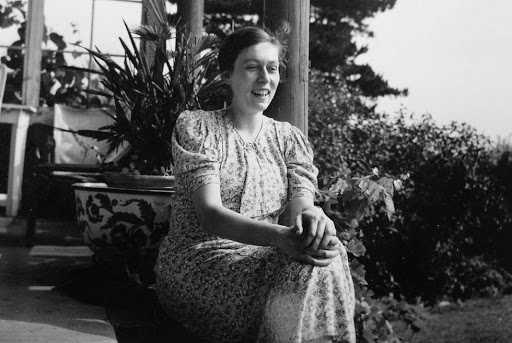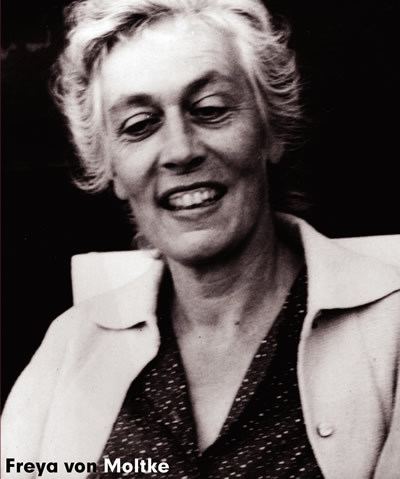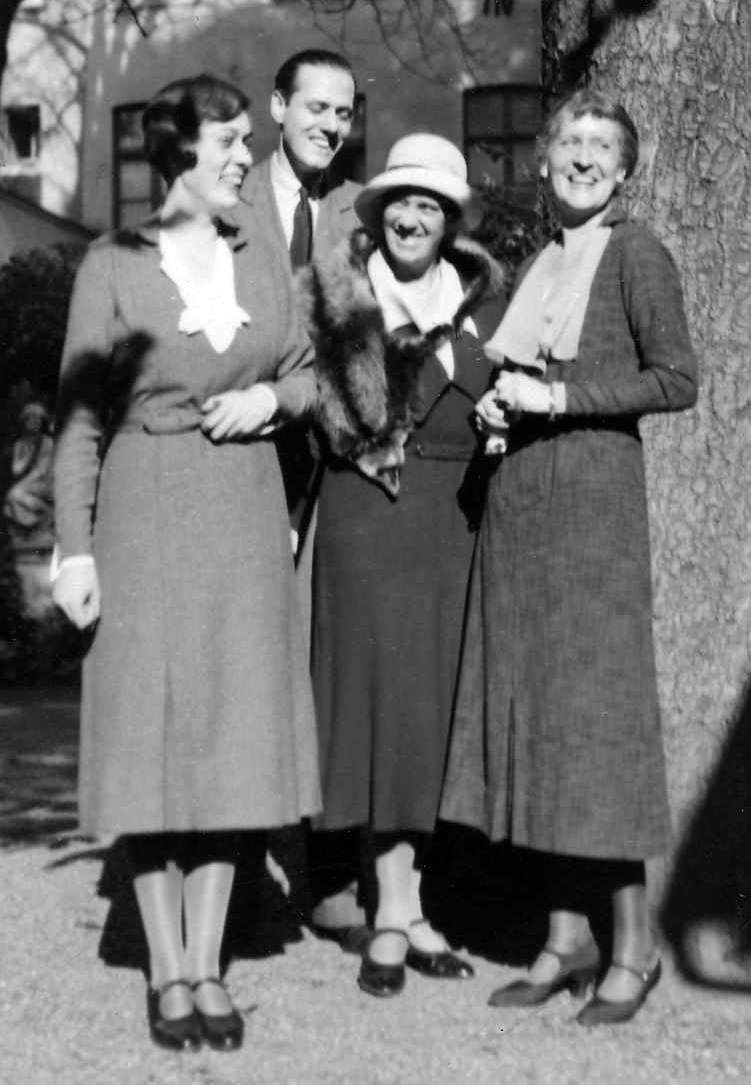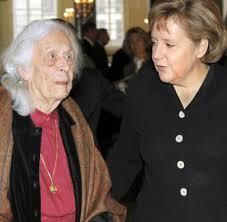Freya von Moltke
Alan Chadwick met the Countess Freya von Moltke in South Africa where he had gone after the war to act in a local theatre company. She had fled there with her two sons and her mother after her husband was killed by Adolf Hitler for his role in the German resistance movement. She described to me one time how they had adopted Alan into the family, and that he always visited with them when he was in Cape Town. They would go to the beach together or on long hikes up Table Mountain. Alan was fond of her, she said, and of the boys.
Years later, Freya accompanied the historian and social philosopher, Eugen Rosenstock-Huessy, to Santa Cruz where he had been invited to teach for a semester by his former student, the then Cowell College Provost, Page Smith. It was then that Freya heard about plans to start a garden at the university. Paul Lee had conceived of the project, and the chancellor was agreeable. She suggested to Paul that her friend Alan Chadwick would be just the one to lead such an endeavor, and that he was due to visit her within a few weeks there in Santa Cruz. Although Alan was initially cool to the idea, Freya prevailed upon his altruistic sensibilities and eventually brought him around. 
Because of Alan's reverence for this woman, and because of her role in the inception of the garden, we apprentices always regarded her as a kind of spiritual godmother of the garden project. Few had ever met her, but we were kindred souls, or so we felt. For more on Freya, see the audio recording by Greg Haynes entitled, "Alan Chadwick and the Countess Freya von Moltke."
Freya von Moltke in South Africa

http://www.freyavonmoltke.com/
This is a link to a website devoted to the film, directed by Rachel Freudenburg, entitled, "Freya!" It is a tribute to Freya von Moltke (1911-2010) and her work to promote understanding and peace in the world. The website also provides photographs of her and information about her family's involvement in the resistance movement against Adolf Hitler within Germany during the Second World War. As of June 2013, we have been informed that this film is now available on DVD in the USA from the above website.
Helmuth von Moltke, "Letters to Freya: 1939-1945", Vintage, New York, 1995
During the Second World War, Freya and her husband, Helmuth, organized a group of influential members of German society who were against the machinations of the Third Reich. They began to plan for the future of Germany after Adolf Hitler, and a series of meetings took place on the family estate at Kreisau in Silesia. Some of these members later formulated a plot to kill Hitler by planting a bomb in a briefcase, which was left in a staff meeting where Hitler was present. The bomb malfunctioned, and the plotters were discovered. Although Helmuth von Moltke was not directly involved in this attempt on Hitler's life, he was arrested, convicted of treason and, after a year in prison, executed. During the period of his imprisonment he wrote a letter alm ost every day to his wife, and these, along with some earlier correspondence, were published in 1995 under the title, "Letters to Freya: 1939-1945."
ost every day to his wife, and these, along with some earlier correspondence, were published in 1995 under the title, "Letters to Freya: 1939-1945."
This correspondence, while valuable in its own right, is especially interesting to those who knew and worked with Alan Chadwick. Because of the close friendship between Alan and Freya, and specifically because of her involvement in bringing Alan to Santa Cruz, one can perceive a chain of events and personalities extending through time, linking those individuals, in the struggles of their day, to us, in the struggles of our day.
After the death of her husband, Freya eventually became the companion and personal secretary to Eugen Rosenstock-Huessy, a historian who taught for many years at Dartmouth College. Rosenstock-Huessy had been forced to flee Germany during the war, and it was largely based upon principles that he advocated that the Peace Corps was instituted under President John F. Kennedy.
Photograph of Helmuth James Graf von Moltke and his bride, Freya Deichmann, with their mothers (von Moltke center, Deichmann right) on 18 October 1931 in Cologne, Germany (unknown photographer). Image supplied by Freya von Moltke, widow of Helmuth James von Moltke, with express permission for it to be used freely world-wide without constraint.
The work of Alan Chadwick, though intensely personal, also had a political dimension to it.. On a personal level, his students learned to be awake to the mysteries of nature and the garden, and this awakening had deeper ramifications in their lives, since the eyes, once open, see beyond the garden gates. But an aware population is far more difficult to bring under political control than one stupefied by inane media and lifeless food. Alan was fond of quoting Robert Graves:
"The decline of true taste for food is the beginning of a decline in a national culture as a whole. When people have lost their authentic personal taste, they lose their personality and become the instruments of other people's wills."
In the Germany of Helmuth von Moltke’s day, millions of people fell under the sway of a few madmen. In our day, there is a similar danger. Large segments of the population have become apathetic and docile, and risk becoming the instruments of other people’s wills, if they haven’t already done so. Alan’s was a voice crying in the wilderness, but he was part of an extended family of like-minded prophets; one that included Freya and Helmuth von Moltke.

Freya von Moltke with German Chancellor Angela Merkel
Spiritual Streams
Rudolf Steiner speaks at length of spiritual streams that exist throughout human history. He argues that particular groups of individuals inherit specific intentions as part of their earthly destiny. These people are born contemporaneously and somehow find each other during the course of their lives. Together, they work at the tasks to which they have aligned themselves as pre-earthly intentions. These intentions may be for the general good of humanity or, regretably, they may also be quite otherwise. Sometimes the various groups find themselves in stark conflict with one another. As Steiner describes it, these earthly battles may reflect larger cosmological conflicts that impinge on realms beyond those perceptible by our ordinary sense organs.
If there is truth to any of this, then one can imagine, for example, that the individuals who worked together with Adolf Hitler formed one such group. These people were intensely idealistic, though that idealism was misguided and patently evil. The intense idealistic fervor that possesses a person, whatever the idea or ideology may be, is a force to be reckoned with, and is often larger than the individual person involved.
One can also look at those who organized themselves in opposition to Hitler as another such historical stream. For whatever conscious or unconscious motives, they put themselves, to the extent that they could, between Hitler and the human beings whom he would have destroyed. They allied themselves in a league of mercy and humanity that eventually became more important for them than their own personal lives.

The Countess Freya von Moltke
Who can say if Steiner knew what he was talking about with respect to these spiritual streams. I have never met anyone with the spiritual vision or clairvoyance necessary to verify claims like these. But I have to confess that, on some level, the idea resonates. Even if there is only a grain of truth in it, and even if, in contrast to Steiner's view, the personal alignments to these historical trends are entirely limited to the earthly life of the person involved and not meta-historical movements that persist for centuries, even then I would consider it a privilege to be aligned to the spiritual stream that included the likes of Helmuth and Freya von Moltke and Alan Chadwick.
I would suggest that something of this sort is part of the inheritance that Alan gave to his students. He bequeathed to them a place in the historical succession of this tribe, of this spiritual stream, of this religio-philosophical intentional community that has a mission and a sacred obligation to fight for the protection of the human spirit. And although membership in this community is an honor, it is also a burden because the forces of opposition to these intentions are enormous and they are relentless.
I often wondered how Alan withstood the attacks on his integrity, the raw theft of his labors by ungrateful opportunists, the expulsions from the gardens he created that required starting all over again in another place. But when I think about what they did to Helmuth von Moltke, his separation from his wife, his imprisonment, his cruel murder by Hitler, then, by contrast, the mere pawns who fought Alan in his work were nothing. I can almost feel the ghost of Alan Chadwick looking me in the eye and asking, "Well, what did you expect? It's entirely normal for those who chose to fight for the good, the true, and the beautiful to be bashed on the rocks until they either give up or die. Take it or leave it, my dear boy, but don't ever imagine otherwise."
Return to the top of this page
